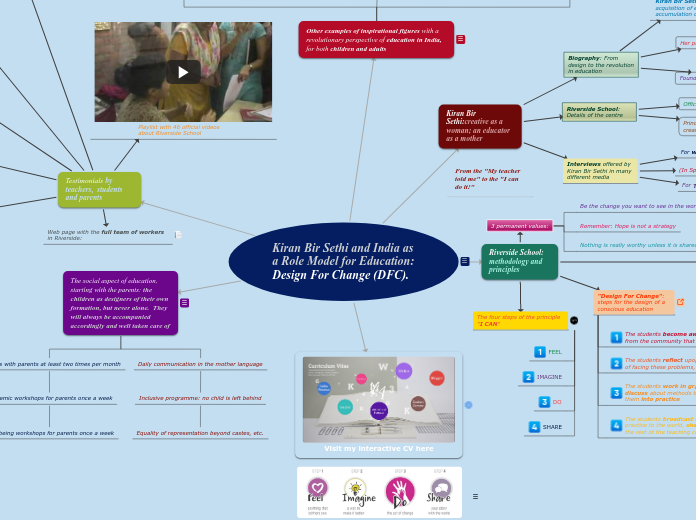Kiran Bir Sethi and India as a Role Model for Education: Design For Change (DFC).
Kiran Bir Sethi:creative as a woman; an educator as a mother
Biography: From design to the revolution in education
Kiran Bir Sethi and the principle of education by means of acquisition of experience and expertise, not by the accumulation of material goods or possessions
Founder of the initiative aProCh (A Protagonist in Every Child):
Her profile in Ashoka:
Riverside School: Details of the centre
Official web page:
Principles of the architecture of the centre: children as creators and determiners of their own learning space:
It was decided to provide the children with an easy access to the bathrooms for the younger grades and also to grant them more mobility around the classroom space (light chairs easily carried about, swivel chairs, etc.)
Prior to the construction of the centre, the kids discussed with the architect and designer of the centre to decide in groups how it should be
The creation of the Gazebo: a nice and original place to be in contact with nature, and where one can walk, have lunch, display your works or your artworks

Students enjoying the Gazebo space while they make use of the ICT to study
Interviews offered by Kiran Bir Sethi in many different media
(In Spanish) For Euskadi+innova:
For TED:
For we_magazine:
Riverside School: methodology and principles
"Design For Change": steps for the design of a conscious education
The students become aware of important local issues from the community that need solving
The students reflect upon these issues and imagine methods of facing these problems, with the goal to fix them
The students work in groups to share their ideas and discuss about methods to turn them into a reality, putting them into practice
The students broadcast the fruits of their research and practice to the world, sharing their work and conclusions with the rest of the teaching community and society in general

Kiran Bir Sethi amongst her students in Riverside School showing in their hands the principle "I CAN"
The four steps of the principle "I CAN"
FEEL
IMAGINE
DO
SHARE
3 permanent values:
Be the change you want to see in the world
Remember: Hope is not a strategy
Nothing is really worthy unless it is shared
Testimonials by teachers, students and parents
Pupils talking about their learning experience in Riverside School
Testimonials by the members of a meditation and corporal awareness workshop started spontaneously amongst a group of students in Riverside
Experiences by the parents in the course of meditation and corporal awareness created by the students in Riverside
Teachers and pupils in action
Playlist with 46 official videos about Riverside School
Video that explains, amongst other things, the integration of the parents in the educative process of their children
Web page with the full team of workers in Riverside:
Other examples of inspirational figures with a revolutionary perspective of education in India, for both children and adults
Rabindranath Tagore
Founder of the school Shantiniketan, the "Abode of Peace" (in Spanish)
Nobel PrizeAmartya Sen studied at Tagore's school, and talks about it very frequently with affection
Amartya Sen: Think and Act
Conference about Human Capacity with Amartya Sen in the University of Chicago Law School:
Amartya Sen talking about the sense of British identity
Conference by Amartya Sen about the challenges that social sciences face in the new milennia
Amartya Sen: from identity to violence, a podcast
Sugata Mitra
Creator and designer of the school in the clouds
Creator of the concept of the hole-in-the-wall school, and Minimally Invasive Education
Sugata Mitra: Can Kids Teach Themselves?
Sugata Mitra, build a school in the cloud
Sugata Mitra in Newcastle University
Kiran Bedi
Reformer of Tihar Jail, according to the principles of education of the inmates and their introduction to the Vipassana meditation
The very Dalai Lama has praised her efforts in the reform of Tihar Jail. Here is a link with a very detailed description of her reformation programme:
Documentary about Tihar Jail and the reforms carried out by Kiran Bedi
Vipassana in Tihar Jail
The social aspect of education, starting with the parents: the children as designers of their own formation, but never alone. They will always be accompanied accordingly and well taken care of
Meetings with parents at least two times per month
Academic workshops for parents once a week
Well-being workshops for parents once a week
Daily communication in the mother language
Inclusive programme: no child is left behind
Equality of representation beyond castes, etc.

Visit my interactive CV here

